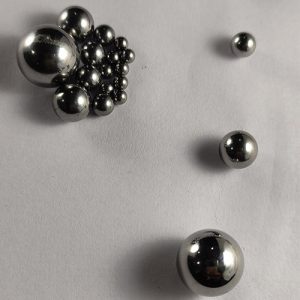
Stainless Steel Balls
Introduction
DSP Precision Products Pvt. Ltd., a pioneer in precision ball manufacturing, has been a leading player in the industry for over 25 years. Renowned for its high-quality products and exceptional service, the company specializes in the production of stainless steel balls, serving clients globally. This comprehensive description explores the various facets of stainless steel balls manufactured by DSP Precision Products Pvt. Ltd., including their material properties, manufacturing processes, quality assurance measures, customization options, and global export capabilities.
1. Company Overview
1.1. History and Expertise
Established over 25 years ago, DSP Precision Products Pvt. Ltd. has consistently provided precision-engineered solutions to a broad range of industries. The company’s long-standing expertise in the manufacturing of stainless steel balls underscores its commitment to quality and innovation. Over the years, DSP Precision Products has built a reputation for reliability and excellence, making it a trusted name in the industry.
1.2. Global Export Capabilities
With a robust global export network, DSP Precision Products Pvt. Ltd. serves clients across various continents. Its international reach reflects the company’s ability to meet global standards and deliver high-quality products worldwide. Efficient export operations ensure timely delivery and consistent product quality, reinforcing the company’s status as a preferred supplier in global markets.
2. Stainless Steel Ball Specifications
2.1. Material Composition
Stainless steel balls produced by DSP Precision Products Pvt. Ltd. are made from high-grade stainless steel alloys known for their durability, corrosion resistance, and excellent mechanical properties. The primary alloys used include:
- AISI 304 (SS304): This is the most common stainless steel alloy used for manufacturing balls. It is composed of approximately 18% chromium and 8% nickel, providing excellent corrosion resistance, formability, and strength.
- AISI 316 (SS316): This alloy contains around 16% chromium, 10% nickel, and 2% molybdenum. The addition of molybdenum enhances corrosion resistance, particularly against chlorides and marine environments, making it suitable for more demanding applications.
- AISI 440C (SS440C): A high-carbon stainless steel, AISI 440C contains about 16-18% chromium and up to 1.2% carbon. It is known for its high hardness and wear resistance, making it ideal for applications requiring exceptional durability.
2.2. Mechanical and Physical Properties
- Hardness: Stainless steel balls exhibit high hardness levels, typically ranging from 50 to 60 HRC (Rockwell Hardness C). This hardness is essential for their performance in various mechanical applications.
- Corrosion Resistance: The chromium content in stainless steel provides excellent resistance to oxidation and corrosion. This property ensures that the balls maintain their integrity even in harsh environments.
- Surface Finish: Stainless steel balls are produced with a high-quality surface finish, which minimizes friction and wear in applications. The surface can be mirror-polished to enhance appearance and reduce friction further.
3. Manufacturing Process
3.1. Raw Material Preparation
The manufacturing process begins with selecting high-quality stainless steel billets or rods. These raw materials are sourced from reputable suppliers and are inspected for compliance with industry standards. The billets are then melted and cast into the desired shape in a controlled environment to ensure uniformity and quality.
3.2. Forming the Balls
- Forging: The stainless steel billets are heated and forged into rough spherical shapes using hydraulic or mechanical presses. Forging helps to align the grain structure of the material, improving its mechanical properties.
- Cold Heading: In some cases, the forged spheres are further shaped using cold heading techniques. This process involves forming the material at room temperature to achieve precise dimensions.
3.3. Heat Treatment
- Annealing: After forging, the balls undergo an annealing process to relieve internal stresses and enhance their mechanical properties. This involves heating the balls to a specific temperature and then cooling them slowly.
- Hardening: For certain stainless steel grades, additional hardening processes may be applied to increase hardness and wear resistance. This involves controlled heating and cooling cycles to achieve the desired properties.
3.4. Grinding and Finishing
- Grinding: Precision grinding is employed to achieve exact dimensions, roundness, and surface finish of the stainless steel balls. This step ensures that the balls meet stringent size and tolerance specifications.
- Polishing: Following grinding, the balls are polished to achieve a smooth, reflective surface. This polishing process removes any remaining imperfections and enhances the aesthetic and functional qualities of the balls.
3.5. Quality Control SS Balls
Quality control is a critical component of the manufacturing process at DSP Precision Products Pvt. Ltd. The following measures are implemented to ensure that each stainless steel ball meets high standards:
- Dimensional Inspection: Advanced measurement tools are used to verify the diameter, roundness, and surface finish of each ball. This ensures that the balls adhere to specified tolerances and dimensions.
- Hardness Testing: The hardness of the balls is tested using Rockwell or Vickers hardness testers to confirm that they meet the required hardness levels.
- Surface Quality Check: The surface of the balls is inspected for smoothness and the absence of defects such as scratches, dents, or imperfections.
4. Customization and Flexibility
4.1. Custom Sizes and Specifications
DSP Precision Products Pvt. Ltd. offers extensive customization options for stainless steel balls. Clients can specify various sizes, from small precision balls to larger industrial sizes. The company’s flexibility allows for the production of balls tailored to specific application requirements.
4.2. Custom Surface Treatments
Customers can request various surface treatments for stainless steel balls, including coatings or additional polishing. These treatments can enhance properties such as corrosion resistance or improve the appearance of the balls.
4.3. Technical Support
The company’s experienced technical team provides expert guidance to clients, assisting with material selection, design considerations, and manufacturing processes. This support ensures that customized stainless steel balls meet the exact needs of each application.
5. Applications
5.1. Industrial Applications
- Bearings: Stainless steel balls are widely used in bearings due to their high hardness and durability. They provide smooth rotation and reduce friction in various types of bearings, including ball bearings and roller bearings.
- Valves: In industrial valves, stainless steel balls are employed for their resistance to corrosion and wear. They ensure reliable operation in fluid control applications.
5.2. Automotive Industry
- Transmission Systems: Stainless steel balls are used in automotive transmission systems, where their strength and resistance to wear contribute to the smooth operation of gear mechanisms.
- Suspension Systems: They are also used in suspension systems, where their durability and performance under dynamic loads are crucial.
5.3. Aerospace Industry
In the aerospace industry, stainless steel balls are used in critical components such as bearings and actuators. Their high strength and precision are essential for the reliable performance of aerospace systems.
5.4. Mining and Construction
- Mining Equipment: Stainless steel balls are employed in mining equipment, such as crushers and mills, where their hardness and wear resistance are critical for processing hard materials.
- Construction Machinery: They are used in construction machinery and equipment, where they withstand heavy loads and abrasive conditions.
5.5. Scientific and Laboratory Equipment
Stainless steel balls are utilized in scientific and laboratory equipment for their precision and resistance to corrosion. They are used in applications such as mixing, grinding, and calibration.
5.6. Medical Devices
- Surgical Instruments: Stainless steel balls are used in various surgical instruments and medical devices due to their biocompatibility, strength, and resistance to sterilization processes.
- Diagnostic Equipment: They are also employed in diagnostic equipment where precision and reliability are crucial.
6. Advantages of DSP Precision Products Pvt. Ltd.’s Stainless Steel Balls
6.1. Extensive Expertise
With over 25 years of experience, DSP Precision Products Pvt. Ltd. has developed a deep understanding of stainless steel ball manufacturing. This expertise ensures that each ball is produced to the highest standards of quality and performance.
6.2. Premium Quality Assurance
The company’s commitment to using high-quality materials and implementing rigorous quality control measures guarantees that each stainless steel ball meets stringent industry standards. The focus on quality ensures reliability and durability.
6.3. Customization Capabilities
DSP Precision Products Pvt. Ltd. offers extensive customization options for stainless steel balls, allowing clients to obtain products tailored to their specific needs. This flexibility enhances the utility and performance of the balls in various applications.
6.4. Global Export Reach
The company’s global export capabilities enable it to serve a wide range of international clients. DSP Precision Products Pvt. Ltd.’s reputation for quality and reliability has established it as a preferred supplier in global markets.
7. Environmental Considerations
7.1. Sustainable Practices
DSP Precision Products Pvt. Ltd. is committed to sustainability and minimizing the environmental impact of its manufacturing processes. The company implements energy-efficient practices and strives to reduce waste throughout its operations.
7.2. Recycling and Waste Management
Stainless steel is a highly recyclable material, and the company’s recycling and waste management practices contribute to resource conservation and environmental sustainability. Scrap material from production is collected and recycled to reduce environmental impact.
8. Conclusion
DSP Precision Products Pvt. Ltd.’s stainless steel balls exemplify the company’s dedication to precision engineering, premium quality, and customer satisfaction. With over 25 years of experience and a strong global presence, the company has established itself as a leader in stainless steel ball manufacturing.
The combination of extensive industry expertise, advanced manufacturing processes, rigorous quality control, and extensive customization capabilities ensures that each stainless steel ball meets the highest standards of performance and reliability. Whether for industrial, automotive, aerospace, mining, scientific, or medical applications, DSP Precision Products Pvt. Ltd. continues to deliver products that enhance
| Grade | Type | Characteristics | Applications |
|---|---|---|---|
| 304 | Austenitic | Excellent corrosion resistance, good formability and weldability | Kitchen equipment, food processing, general industrial |
| 316 | Austenitic | Superior corrosion resistance, especially against chlorides and marine environments | Chemical processing, marine environments, medical devices |
| 310 | Austenitic | High temperature resistance, good oxidation resistance | Furnace parts, heat treatment equipment |
| 321 | Austenitic | Excellent resistance to oxidation and corrosion at high temperatures, stabilized with titanium | Aerospace components, exhaust systems, chemical processing |
| 347 | Austenitic | Good oxidation resistance and stability at high temperatures, stabilized with niobium | Aircraft exhaust stacks, heat exchangers, high-temperature applications |
| 430 | Ferritic | Good corrosion resistance, magnetic properties | Automotive trim, appliances, kitchenware |
| 409 | Ferritic | Moderate corrosion resistance, good formability and weldability | Automotive exhaust systems, catalytic converters |
| 441 | Ferritic | Good corrosion resistance, especially in high-temperature environments | Automotive exhaust systems, heat exchangers, architectural applications |
| 410 | Martensitic | Good corrosion resistance and hardness, can be hardened by heat treatment | Cutlery, surgical instruments, valves |
| 420 | Martensitic | High hardness and wear resistance, moderate corrosion resistance | Surgical instruments, knives, tooling |
| 440C | Martensitic | High hardness, excellent wear resistance, good corrosion resistance | High-performance bearings, valve components, tools |
| 2205 | Duplex | High strength, good corrosion resistance, especially to stress corrosion cracking | Chemical processing, oil and gas, marine environments |
| 2507 | Duplex | High strength, excellent corrosion resistance, especially to pitting and crevice corrosion | Chemical processing, seawater applications, high-pressure applications |
| 17-4 PH | Precipitation Hardening | High strength, good corrosion resistance, heat treatable | Aerospace, marine, chemical processing industries |
| 15-5 PH | Precipitation Hardening | High strength, excellent toughness, good corrosion resistance | Aerospace components, industrial machinery, chemical processing |
| 904L | Specialty | Extremely resistant to corrosion, especially in acidic environments | Chemical processing, marine environments, oil and gas industries |
| 3CR12 | Specialty | Low-cost corrosion-resistant steel, offers good resistance to atmospheric corrosion | Structural applications, components exposed to the elements |
Notes:
- Austenitic Stainless Steels: These are non-magnetic and have excellent corrosion resistance. They are the most common type of stainless steel used in various applications.
- Ferritic Stainless Steels: Magnetic and have good corrosion resistance, especially in atmospheric conditions, but less resistant to oxidation and high temperatures compared to austenitic steels.
- Martensitic Stainless Steels: Magnetic and can be hardened by heat treatment. They are used where high strength and wear resistance are required.
- Duplex Stainless Steels: Combine the properties of austenitic and ferritic steels, offering high strength and excellent resistance to stress corrosion cracking.
- Precipitation Hardening Stainless Steels: Designed for high-strength applications, they can be heat treated to achieve superior mechanical properties.
- Specialty Grades: These include high-performance alloys designed for specific applications requiring exceptional corrosion resistance or strength.
This chart provides an overview of the different stainless steel grades and their typical uses. For specific needs, it’s always best to consult with a materials engineer or supplier to ensure you choose the appropriate grade for your application.



